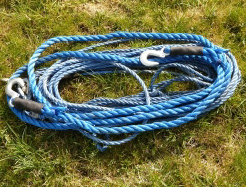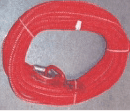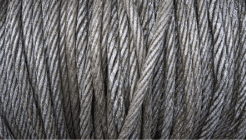Winch line ropes stand ready when called upon to pull and lift. Today winch ropes are safer and more dependable than ever as synthetic fibers have revolutionized the industry. For that reason, they are easily forgotten and neglected.

But that doesn’t mean your winchline rope doesn’t require some care, like washing. That’s right, dirt and sand can work into a winch ropes fibers and cause damage. There are 2 ways to clean your rope.
- Unwind the rope and hose it down end to end. That’s the easy way, but not the most effective cleaning method.
- The more effective and less easy way to clean your rope is to wash it with a mild detergent in a bucket of water, then hose it off to rinse.
Rope manufacturers offer a urethane coating that is actually pretty inexpensive – about $.30 to $.40 per foot, or about $33.00 for a 100-foot rope. The coating is applied after the rope is braided, and it is spliceable. The urethane coating firms the rope, increases snag resistance, improves abrasion resistance, and will preserve your rope by preventing grit and contaminants from getting into the fibers.

Getting back to cleaning your rope, if this all sounds like too much work, consider the alternative — a steel winch rope. Steel cable was the gold standard until recently. Synthetic fiber rope is more expensive, but it is worth the price. Here’s why:
- Synthetic rope is safer – it doesn’t store energy when under a load. If it happens to break, it will fall to the ground. Steel cable does store energy when in use. It can become a dangerous projectile upon breaking.
- Your synthetic rope may not last as long as steel cable, but if your synthetic rope does break, it can be repaired in the field if you know what you’re doing. That is not the case with steel cable.
- Synthetic rope is more flexible than steel and easier to handle. For one thing, synthetic rope doesn’t kink or develop sharp burrs. You may not even have to wear gloves to protect your hands.
- Synthetic rope is lighter than steel cable. One person is all that is needed now to handle the winchline rope. Besides, some vehicles are sensitive to weight, making synthetic very useful.
- Synthetic rope has higher breaking strength than comparable steel. For that reason, you may be able to use a smaller diameter rope.

Utility Equipment Parts offers winch ropes made of many different synthetic fibers including double braided polyester which has a unique cordage finish that offers high strength and low stretch properties. We also offer ropes made of polydyne cordage which utilizes a polyester sleeve over a nylon core making a long wearing rope with extraordinary dynamic capabilities. For even greater strength, UEP offers winch ropes made of dyneema fiber. Dyneema is a torque-free 12-strand single braid that offers extremely low stretch and superior wear resistance.
The “UEP” Guys 
 We Know Parts!
We Know Parts!